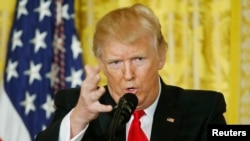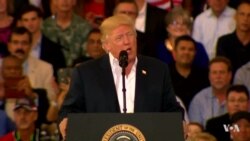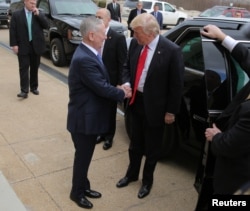U.S. President Donald Trump’s increasingly ferocious attacks on America’s news media sparked equally fierce commentary Sunday in Washington and beyond.
“If you want to preserve democracy as we know it, you have to have a free and, many times, adversarial press," said Republican Senator John McCain on NBC’s Meet The Press program. "And without it, I am afraid that we would lose so much of our individual liberties over time. That's how dictators get started."
One day after taking to Twitter to brand top news outlets “the enemy of the American people”, Trump continued savaging the news media at a Florida rally.
“They become a big part of the problem, they are part of the corrupt system,” Trump told thousands of supporters Saturday. “When the media lies to people I will never ever let them get away with it, I will do whatever I can that they don't get away with it, they have their own agenda and their agenda is not your agenda.”
Lawmakers of both parties routinely complain about news coverage, but defend a free press. Many recoiled from Trump’s words.
“This is something that you hear tin-pot dictators say when they want to control all of the information,” said Representative Adam Schiff, a California Democrat, on ABC’s This Week program.
“Of all the things he has said since he became president or since the election, this to me was the most devastating and the most alarming. That he essentially views the First Amendment [to the Constitution], because that is what these organizations represent, as an enemy of the people.
Republican Senator Ben Sasse weighed in by tweeting portions of the Bill of Rights guaranteeing free speech and freedom of the press. Others sought to downplay the controversy.
“I see President Trump expressing his opinion, rather forceful in his own distinct way,” Republican Senator Rand Paul of Kentucky said on This Week. “But I see no evidence that anybody is putting forward any kind of legislation to limit the press.”
“I am not a great fan of [Trump’s] daily tweets,” said Senate Majority Leader Mitch McConnell late last week. “What I am a fan of is what he has been actually doing.”
Some closest to Trump are distancing them from the president’s remarks.
“I have had some contentious times with the press,” Defense Secretary James Mattis told reporters during a visit to Abu Dhabi. “But no, the press as far as I am concerned are a constituency that we deal with, and I do not have any issues with the press myself.
While sporadic anti-Trump protests continued across the country, the president’s fiercest backers echoed his message.
"He is right on point because, unfortunately, most of the news media distorts it and twists it [the news] to their benefit,” said Hamilton Campos, who attended Trump’s rally Saturday. “You know, they were hoping that Hillary [Clinton] was going to win and she did not.”
While rallying supporters, Trump also appears to be bolstering groups eager to challenge his administration in court. U.S. civil rights organizations report a surge in donations since last month’s inauguration.







